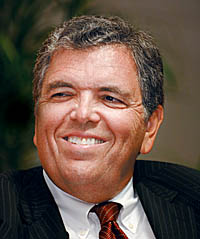
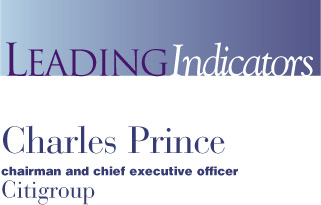
Chuck Prince
is the chairman and chief executive officer of Citigroup,
one of the world's largest financial services companies,
with operations in more than 100 countries. Prince
began his career in 1975 as an attorney at US Steel
Corporation, and in 1979 joined Commercial Credit Company,
a predecessor company to Citigroup. After serving as
chief administrative officer and then as chairman and
chief executive officer of Citigroup's Corporate Investment
Banking Group, he was named chief executive officer
of Citigroup in 2003. Prince holds a bachelor’s
degree, a master's degree in international relations,
and a law degree from the University of Southern California
in Los Angeles, as well as a Master of Laws degree
from Georgetown University.
Chuck
Prince was interviewed by David Wighton, the US banking
editor and New York bureau chief of the Financial
Times. |
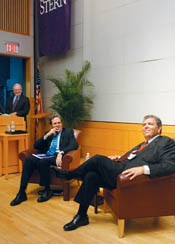
NYU Stern Dean Thomas F. Cooley introduces Chuck Prince
and David Wighton to an audience of Stern students and
alumni at the CEO Series event in September. |
David Wighton: When you became chief executive of Citigroup
in October 2003, what were the key challenges you faced?
Chuck Prince: I thought the primary
challenge we were facing was how to grow an organization
that had topped out in the ability to use an M&A strategy
as the primary vehicle for driving growth. But, it turned
out, we took a detour based on a variety of regulatory issues.
DW: Did the regulatory issues stem partly from the nature
of the group that had developed as a very acquisitive machine?
CP: Because our company was largely built through acquisitions,
we ended up with not one corporate culture, but a wide variety
of cultures inside one company. People would end up making
decisions to maximize short-term returns without considering
the long-term nature of the institution. We're about to celebrate
our 200th anniversary as a company in 2012, and I am a big
believer that we have to value the legacy of the institution.
So in hindsight, not having a focus on a strong set of core
values, which would balance everybody's desire for short-term
results against the longer term nature of being in this business,
was a mistake.
DW: Could you tell us how you've gone about the process of
instilling a more uniform corporate culture and some of the
lessons you learned from looking at other companies?
"I don't tend
to look backwards and say, 'Gee, I made a mistake here,
and gee, I made a mistake there.' I'm sure there were
hundreds, maybe thousands of mistakes; things that didn't
work out." |
CP: During
the course of 2004, we had a variety of regulatory issues
that fell out of the sky and hurt us badly. They came from
disparate parts of the business. Most people know about the
private bank issue in Japan. Many people know about the MTS
trade in London. And at that point, the regulators became
so, I think the right word is – embarrassed
by the problems that kept popping up, that they basically
told us that we had to get our act in order. In the fall
of 2004, the senior leadership of the company resolved
to change things and to start the process of creating that
culture. Now I emphasize the word start because you don't
create a culture in six months or a year or two years.
We looked internally to the organization
for the best practices. We also went and visited two dozen
external companies. The first one we went to visit was Johnson & Johnson
to learn how they sustain a solid core culture at the center
of an organization of large, disparate organizations to prevent
the centrifugal forces from spinning people out and away.
We then boiled it down to something called the Five Point
Plan. There were actually about 60 points. We rolled it out
on March 1, 2005, simultaneously in 100 countries around
the world. I did one event in New York, and I flew out to
South Dakota and did the same event, trying to not shock,
but to command the attention of the organization. And from
there, over the course of the year, we had a rollout plan
so that something happened every few weeks. It took us the
entire year, all of 2005, to put all the bricks in the wall.
DW: You mentioned the need to shift from an organization that
grows by acquisition to one that grows organically. How well
has that gone?
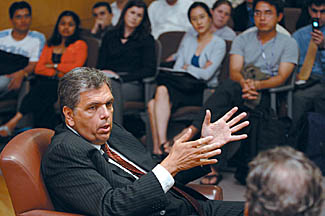
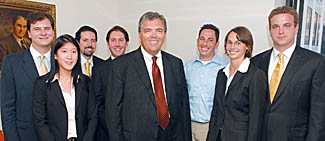
Top: Chuck Prince is interviewed by David Wighton.
Bottom: Chuck Prince with a group of NYU Stern MBA students
who interned at Citigroup. |
CP: We more or less had to take a year off. I think now we're
back on that track, and I feel very good about the progress
we're making. We've just rolled out a brand new client focus
activity. We're investing a lot in technology. We're opening
new branches for the first time.
DW: Given the stepped up investment on organic growth, some
Wall Street observers question whether you're controlling expenses
and whether you're going to get the returns that you hoped
for in the time that you hoped for.
CP: In fact, a substantial amount of our investments are paying
off. We had 10 percent revenue growth and about 2 or 2.5 percent
of that came from investments we had made just last year. But
many of the investments we make take a while to pay off. This
year we're going to open 100 retail bank branches in the US.
Last year we opened 20. It takes about three years for a retail
bank branch to break even.
DW: Another concern expressed
by Wall Street is that Citigroup is just too big, too difficult
for it to be manageable.
CP: I don't hear that much anymore.
We are manageable. We are in control. We have excellent
regulatory relationships around the world. What I hear
now is: "Are you too big to grow?" The
issue for the organization is: Can we transform ourselves from
a financial engineering kind of a company to an organic growth
company? I think we can.
DW: Tell us a bit about what you look for in managers.
CP: What I look for are people who have
a real passion for what they are involved in, which is an
overused word but an important word. To have a sense of ownership
of issues. To have a sense of responsibility. The most important
thing I can get from a manager is somebody who will come
in a constructive way and say, "I think you're on the
wrong course here."
DW: How big can Citigroup get? You point out that actually
you've got small market shares in most of your markets.
CP: When Sandy Weill first came to Commercial
Credit, which is where I was in 1986, and I think we had 20,000
employees, and the notion that we would double in size was
astonishing. And then we grew and grew. Travelers merged with
Citicorp in 1998, and it was the biggest merger in the history
of the universe. Then, we had 178,000 employees. Today we have
340,000 employees around the world. And I think that if we
do it the right way, if we are focused on having core elemental
values that translate into dozens of languages that are embraceable
by people in different businesses, then I think we are not
at, or even near, the practical constraints of our growth.
Audience Questions
Q: How do you manage to maintain any kind of balance between
life and work?
CP: I'm going to give you a serious answer, because it's a
very serious question. I have spent my entire life as a workaholic.
I don't mince words about that. It really destroyed my first
marriage. Happily, it did not impact the relationship with
my two kids. So I'm not a good person to advise, even in hindsight,
on how to do it differently. I'm remarried, and my wife and
I try to carve out private time together. So this last weekend
was our anniversary, and we went off to California, and I turned
off my Blackberry. It's very important to do that.
"I
think we're going to see a diffusion away from New York
as a center of financial activity. New York will not
be unimportant, but the rise of London, Hong Kong, Dubai,
and other places is going to be quite significant." |
Q: As you advanced in your career, what were some risks that
you took that didn't turn out so well and what was learned
from those?
CP: I don't tend to look backwards and
say, "Gee, I made
a mistake here, and gee, I made a mistake there." I'm
sure there were hundreds, maybe thousands of mistakes; things
that didn't work out. There's a great book last year about
Franklin Roosevelt's efforts to change the economy during The
Depression. He tried a whole bunch of things, almost all of
which failed. And he would just hit it and bounce off and go
to the next one. You've got to keep moving.
Q: More and more companies are going to Hong Kong and London
to raise capital because of the high fees and because of growing,
complex regulatory issues in the States. How are companies
like yours dealing with this challenge?
CP: We're a US regulated bank, so wherever we get our capital,
we're still regulated by the folks in Washington. We're also
regulated by people in London and Hong Kong, and other countries
in which we operate. We go around the world raising capital
in lots of different places based on the economics of where
we can raise capital more cheaply. I think we're going to see
a diffusion away from New York as a center of financial activity.
New York will not be unimportant, but the rise of London, Hong
Kong, Dubai, and other places is going to be quite significant.
Q: There are obvious pros and cons of separating the positions
of chief executive officer and chairman of the board. Given
your recent assumption to both hats, what are your thoughts
on how it's going?
CP: I think that the separation of chairman and CEO, to be
quite candid, is a peculiarly British phenomenon. In the United
States, we tend to have a lead director. And in our case, we
have a lead director who is very active. Every time we have
a board meeting, the outside directors meet privately without
any insiders, including myself.


![]()